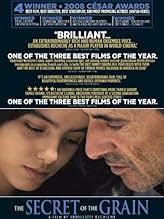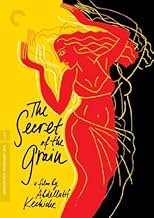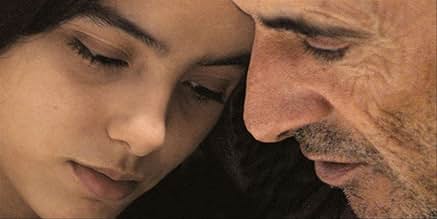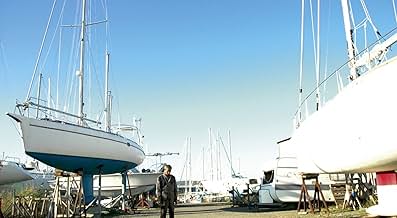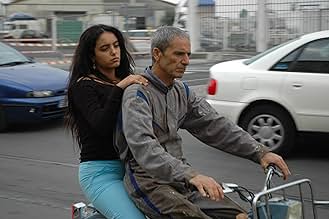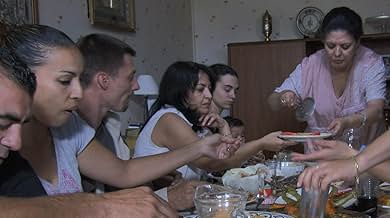La graine et le mulet
- 2007
- Tous publics
- 2h 31min
NOTE IMDb
7,4/10
8,1 k
MA NOTE
Dans le sud de la France, un ouvrier de chantier naval d'origine arabe poursuit son rêve d'ouvrir un restaurant en compagnie de la fille de sa conjointe.Dans le sud de la France, un ouvrier de chantier naval d'origine arabe poursuit son rêve d'ouvrir un restaurant en compagnie de la fille de sa conjointe.Dans le sud de la France, un ouvrier de chantier naval d'origine arabe poursuit son rêve d'ouvrir un restaurant en compagnie de la fille de sa conjointe.
- Réalisation
- Scénario
- Casting principal
- Récompenses
- 19 victoires et 9 nominations au total
Nadia Taoul
- Sarah
- (as Nadia Taouil)
Avis à la une
Tunisian born French director Abdellatif Kechiche's third feature Secret of the Grain is dedicated to his father whose silence after a long day of hard work reflects the demeanor of the film's lead protagonist, Slimane Beiji (Habib Boufares), a Tunisian immigrant who has been laid off from his job in the shipyards after thirty five years. Winner of best picture, director, screen play and actress awards at the 2008 Cesar Awards, the film is not a Loach-type work of social consciousness but a rich, varied, multi-layered family drama that is universal in its appeal. Although the English title of the film suggests there is some secret held by the grain, the only secret in Secret of the Grain is how Kechiche manages to seamlessly weld together into a cohesive whole such disparate elements as the traditions of great cooking, the problems immigrants confront when dealing with white authority, and the desire to leave a legacy to your children.
Set in the French coastal village of Séte on the Mediterranean, the grain in the title refers to couscous, a diet staple of Tunisian immigrants and a dish that Slimane hopes to use to turn a dilapidated old boat into a profitable restaurant with his ex-wife Souad (Bouraouia Marzouk) doing the cooking. Shot with a hand-held camera that bobs and weaves through long takes of eating, animated dinner conversations, and emotional family disputes, the 151-minute Secret of the Grain has the authenticity you would expect if you accidentally stumbled into a Greek restaurant where an animated family dinner was taking place. In a scene at one of the two family dinners that take up half of the film, the length and variety of facial close-ups of people chewing, laughing, and talking in multi-cultural accents is staggering.
The centerpiece of the film is Slimane and his clan consisting of his two sons, five daughters, grandchildren, his ex-wife Souad, his lover Latifa (Hatika Karaoui), and her fiery twenty-year-old daughter Rym (Hafsia Herzi) who adores Slimane and whose energy and business acumen is the catalyst for his risky venture. Slimane, a man of sixty-one whose periods of silence stand in sharp contrast to the loquaciousness of his family, lives in a modest room in a weather-beaten hotel run by Latifa. A generous man, Slimane collects fish from his fisherman friends and delivers them each week to Souad, his older daughter Karima (Faridah Benkhetache); and Latifa.
The first hour delves into mundane family matters. When Slimane visits his eldest daughter Karima (Farida Benkhetache) to deliver some fish, Karima's anger at her three year-old daughter who refuses the potty dominates the conversation which continues for almost ten minutes interspersed with comments about the decline of the shipping industry. Other extended domestic scenes revolve around the escapades of Slimane's irresponsible son Majid (Sami Zitouni) whose extra-marital affairs threaten to drive his Russian wife Julia (Alice Houri) out of the family. The idea of starting a restaurant at age sixty-one raises much skepticism in the community and Slimane's plans are considered too thin and too unsupported by economic reality by the bank he asks for a loan.
To prove the worth of his idea, however, Slimane invites one hundred city officials, potential investors, friends and family to the boat that he, Rym, and his son Riadh (Mohamed Benabdeslem) painstakingly renovated. The opening night turns out to be an astonishing tour de force that combines life-affirming exuberance, sensual music and belly dancing, and an avoidable crisis that leads to heightened family tension and a suspenseful final half hour. Kechiche, a former movie and TV actor, has assembled an outstanding ensemble cast with first rate performances, especially from Boufares and Herzi. Though the film has many discussions about food, it is not a feel-good "food movie" but a complex, deeply intense narrative that elevates one family's personal struggles into a drama of epic scope.
Set in the French coastal village of Séte on the Mediterranean, the grain in the title refers to couscous, a diet staple of Tunisian immigrants and a dish that Slimane hopes to use to turn a dilapidated old boat into a profitable restaurant with his ex-wife Souad (Bouraouia Marzouk) doing the cooking. Shot with a hand-held camera that bobs and weaves through long takes of eating, animated dinner conversations, and emotional family disputes, the 151-minute Secret of the Grain has the authenticity you would expect if you accidentally stumbled into a Greek restaurant where an animated family dinner was taking place. In a scene at one of the two family dinners that take up half of the film, the length and variety of facial close-ups of people chewing, laughing, and talking in multi-cultural accents is staggering.
The centerpiece of the film is Slimane and his clan consisting of his two sons, five daughters, grandchildren, his ex-wife Souad, his lover Latifa (Hatika Karaoui), and her fiery twenty-year-old daughter Rym (Hafsia Herzi) who adores Slimane and whose energy and business acumen is the catalyst for his risky venture. Slimane, a man of sixty-one whose periods of silence stand in sharp contrast to the loquaciousness of his family, lives in a modest room in a weather-beaten hotel run by Latifa. A generous man, Slimane collects fish from his fisherman friends and delivers them each week to Souad, his older daughter Karima (Faridah Benkhetache); and Latifa.
The first hour delves into mundane family matters. When Slimane visits his eldest daughter Karima (Farida Benkhetache) to deliver some fish, Karima's anger at her three year-old daughter who refuses the potty dominates the conversation which continues for almost ten minutes interspersed with comments about the decline of the shipping industry. Other extended domestic scenes revolve around the escapades of Slimane's irresponsible son Majid (Sami Zitouni) whose extra-marital affairs threaten to drive his Russian wife Julia (Alice Houri) out of the family. The idea of starting a restaurant at age sixty-one raises much skepticism in the community and Slimane's plans are considered too thin and too unsupported by economic reality by the bank he asks for a loan.
To prove the worth of his idea, however, Slimane invites one hundred city officials, potential investors, friends and family to the boat that he, Rym, and his son Riadh (Mohamed Benabdeslem) painstakingly renovated. The opening night turns out to be an astonishing tour de force that combines life-affirming exuberance, sensual music and belly dancing, and an avoidable crisis that leads to heightened family tension and a suspenseful final half hour. Kechiche, a former movie and TV actor, has assembled an outstanding ensemble cast with first rate performances, especially from Boufares and Herzi. Though the film has many discussions about food, it is not a feel-good "food movie" but a complex, deeply intense narrative that elevates one family's personal struggles into a drama of epic scope.
Abdel Kechiche's tragicomedy is a film of contradictions and contrasts. It is both quiet and boisterous, with a script that is both understated and energetic, and which explores (among other things) how communities both accept immigrants, and yet remain suspicious of them.
Couscous follows sixty-something Slimane Beiji, a Tunisian-French shipyard worker in the French port town of Sète, played with reserved dignity by Habib Boufares. Despite being divorced, Slimane still spends a lot of time with his ex-wife and their extended family. The rest of his time is spent with his girlfriend and her daughter, who own a quayside hotel.
When Slimane is laid off, it comes as the last straw in a life that has become increasingly redundant. Left with nothing to lose, he hits upon the idea of opening a restaurant on an old boat. The project becomes a focal point for Slimane's extended family: his sons lend a hand with the boat's renovation; his girlfriend's daughter helps acquiring the necessary bank loans and official documents; and his ex-wife will cook the restaurants signature dish the eponymous couscous.
The restaurant works as a symbol of the hopes and dreams of immigrants how all they want is to integrate and work in their new community, whilst still retaining the culture and customs of their homeland. But it also signifies the duality of a community's attitude toward immigrants. During a party thrown to promote Slimane's restaurant, the guests all compliment their host and try their hand at a little Arabic; and yet, when Slimane's back is turned, they whisper amongst themselves that "he's not from around here." But Couscous really shines in its extended scenes of dialogue. At several points during the film we join Slimane and his family as they sit in kitchens or dining rooms and do nothing but talk. And it is a joy to watch. The script shows an eye for authentic dialogue, meandering through topics as diverse as racism in the workplace, the extortionate price of nappies, and using Arabic in the bedroom. The genuine performances from the supporting cast draw us further into these scenes, and the cinematography keeps us there. The camera squeezes between family members, getting the kind of intimate close-ups that give a real impression of a loud family dinner.
This light-hearted attitude, present in the early scenes, contrasts with a grimmer final third, in which situations get progressively worse. And as things get worse, family relationships start to break down.
This also reveals the film's ultimate irony. Slimane's family is a close-knit unit when the members each live separate lives. But when the restaurant brings them together, family unity dissolves and they resort to serious bickering.
Couscous follows sixty-something Slimane Beiji, a Tunisian-French shipyard worker in the French port town of Sète, played with reserved dignity by Habib Boufares. Despite being divorced, Slimane still spends a lot of time with his ex-wife and their extended family. The rest of his time is spent with his girlfriend and her daughter, who own a quayside hotel.
When Slimane is laid off, it comes as the last straw in a life that has become increasingly redundant. Left with nothing to lose, he hits upon the idea of opening a restaurant on an old boat. The project becomes a focal point for Slimane's extended family: his sons lend a hand with the boat's renovation; his girlfriend's daughter helps acquiring the necessary bank loans and official documents; and his ex-wife will cook the restaurants signature dish the eponymous couscous.
The restaurant works as a symbol of the hopes and dreams of immigrants how all they want is to integrate and work in their new community, whilst still retaining the culture and customs of their homeland. But it also signifies the duality of a community's attitude toward immigrants. During a party thrown to promote Slimane's restaurant, the guests all compliment their host and try their hand at a little Arabic; and yet, when Slimane's back is turned, they whisper amongst themselves that "he's not from around here." But Couscous really shines in its extended scenes of dialogue. At several points during the film we join Slimane and his family as they sit in kitchens or dining rooms and do nothing but talk. And it is a joy to watch. The script shows an eye for authentic dialogue, meandering through topics as diverse as racism in the workplace, the extortionate price of nappies, and using Arabic in the bedroom. The genuine performances from the supporting cast draw us further into these scenes, and the cinematography keeps us there. The camera squeezes between family members, getting the kind of intimate close-ups that give a real impression of a loud family dinner.
This light-hearted attitude, present in the early scenes, contrasts with a grimmer final third, in which situations get progressively worse. And as things get worse, family relationships start to break down.
This also reveals the film's ultimate irony. Slimane's family is a close-knit unit when the members each live separate lives. But when the restaurant brings them together, family unity dissolves and they resort to serious bickering.
Diane and I attended this wonderful film in Fremantle this morning and both of us left the theater at its conclusion realising that we had seen an unusual film from an unusual ethnic angle and that the director and actors had completed a superb work.
I adore our Australian films because many of them explore the mundane drama of quiet ordinary life and this film is no exception even though it is French rather than Australian. I guess Hollywood does not believe viewers are sensitive enough to pay to see domestic drama and that the subject matter must always be "bigger than Ben Hurr" but our movies as well as many European movies have proved that the examination of quiet aspects of everyday life can provide extremely compelling material for contemporary films.
IMDb commentators found it off-putting to watch long film sequences about potty training, marital squabbles and restaurant scenes; however, this is the stuff of myriad similar domestic situations that we are all familiar with. The genius being that the director can make these scenes rich enough to watch. Diane and I both believe he did this admirably as well as providing much to discuss and reflect upon later.
We both found it different and endearing that we were allowed into the lives of people and their situations that would be closed to us without this delightful film. Yes, I used the adjective "delightful"; the scenes of domesticity were enlightening and compellingly endearing because we are inundated with Western examples of the genre but few (such as in this film) of other ethnic examples.
A film that should not be missed!
I adore our Australian films because many of them explore the mundane drama of quiet ordinary life and this film is no exception even though it is French rather than Australian. I guess Hollywood does not believe viewers are sensitive enough to pay to see domestic drama and that the subject matter must always be "bigger than Ben Hurr" but our movies as well as many European movies have proved that the examination of quiet aspects of everyday life can provide extremely compelling material for contemporary films.
IMDb commentators found it off-putting to watch long film sequences about potty training, marital squabbles and restaurant scenes; however, this is the stuff of myriad similar domestic situations that we are all familiar with. The genius being that the director can make these scenes rich enough to watch. Diane and I both believe he did this admirably as well as providing much to discuss and reflect upon later.
We both found it different and endearing that we were allowed into the lives of people and their situations that would be closed to us without this delightful film. Yes, I used the adjective "delightful"; the scenes of domesticity were enlightening and compellingly endearing because we are inundated with Western examples of the genre but few (such as in this film) of other ethnic examples.
A film that should not be missed!
Cous Cous is set on the coast of Southern France in a coastal community where traditional industries are dying away. The void opening up with the decline of fishing and boat making industries is considerable, and the sprinkling of tourist interest in the area does little to salve these wounds. The malaise and despondency of the community is encapsulated in the person of Slimane, a taciturn divorcée who is told at the start of this film that he will henceforth receive only part-time employment at the scrapyard where he makes his living.
In the early stages of the film we are also introduced to Slimane's large and diverse family. The family minus Slimane is first brought together for a meal of fish and couscous at the household of Souad, Slimane's former wife. This is the first of several long and engrossing commensal scenes. The rapid, witty dialogue and the skillful close-up camera-work filmed around and among the diners create a remarkable intimacy between the actors and the viewer, so that very soon we are immersed in the family's intrigues and laughing at their bawdy humour.
However, the family is more often in disharmony. The children yearn for Slimane and Souad to resolve their differences, but Slimane is living in a hotel elsewhere in town. The proprietor of the hotel is his new partner and her daughter, Rym, is a close friend. Slimane's children disapprove openly of this situation, but at the same time they have their own problems to face up to, especially the wayward behaviour of Hamid, one of Slimane's sons, who frequently cheats on his fragile wife.
Slimane's despondency intensifies in the wake of his enforced semi-retirement from the scrapyard: he regrets that his family is divided and wishes that he had used his life to create something, to create a legacy for his children. It is in the face of this despair and with the help of Rym, the daughter of the hotel proprietor, that Slimane resolves to create a restaurant on a derelict boat a restaurant for which his ex-wife will cook and which his children will serve in. Rather than turning the rest of the film into a modern-day fairytale, director Abdel Kechiche remains levelheaded and keeps his camera trained on the complex and often strained web of relationships amongst the family members of Slimane's divided family. It is a slow and difficult struggle for Slimane to realise his goal, but Kechiche shows little of the construction of this ship in this long (two and a half hours) film.
In the final stages of the film Slimane is desperate to secure funding for his project and decides to host a grand opening of the restaurant with many eminent local personalities on the guestlist. The dramas and calamities in the protracted finale seem somewhat at odds with the first two-thirds of the film, which is low on drama and feels unstaged (indeed there are many non-professional actors in the cast and probably a considerable amount of improvisation). Nevertheless, as Slimane struggles to ensure that the dinner reaches the diners and the grand opening morphs awkwardly into a long-drawn-out party, the film climbs to a thrilling crescendo and a devastatingly abrupt ending.
In the early stages of the film we are also introduced to Slimane's large and diverse family. The family minus Slimane is first brought together for a meal of fish and couscous at the household of Souad, Slimane's former wife. This is the first of several long and engrossing commensal scenes. The rapid, witty dialogue and the skillful close-up camera-work filmed around and among the diners create a remarkable intimacy between the actors and the viewer, so that very soon we are immersed in the family's intrigues and laughing at their bawdy humour.
However, the family is more often in disharmony. The children yearn for Slimane and Souad to resolve their differences, but Slimane is living in a hotel elsewhere in town. The proprietor of the hotel is his new partner and her daughter, Rym, is a close friend. Slimane's children disapprove openly of this situation, but at the same time they have their own problems to face up to, especially the wayward behaviour of Hamid, one of Slimane's sons, who frequently cheats on his fragile wife.
Slimane's despondency intensifies in the wake of his enforced semi-retirement from the scrapyard: he regrets that his family is divided and wishes that he had used his life to create something, to create a legacy for his children. It is in the face of this despair and with the help of Rym, the daughter of the hotel proprietor, that Slimane resolves to create a restaurant on a derelict boat a restaurant for which his ex-wife will cook and which his children will serve in. Rather than turning the rest of the film into a modern-day fairytale, director Abdel Kechiche remains levelheaded and keeps his camera trained on the complex and often strained web of relationships amongst the family members of Slimane's divided family. It is a slow and difficult struggle for Slimane to realise his goal, but Kechiche shows little of the construction of this ship in this long (two and a half hours) film.
In the final stages of the film Slimane is desperate to secure funding for his project and decides to host a grand opening of the restaurant with many eminent local personalities on the guestlist. The dramas and calamities in the protracted finale seem somewhat at odds with the first two-thirds of the film, which is low on drama and feels unstaged (indeed there are many non-professional actors in the cast and probably a considerable amount of improvisation). Nevertheless, as Slimane struggles to ensure that the dinner reaches the diners and the grand opening morphs awkwardly into a long-drawn-out party, the film climbs to a thrilling crescendo and a devastatingly abrupt ending.
In his sixties, Slimane (Habib Boufares) is a disillusioned and tired man and, since his divorce from his wife, he has become a kind of free electron within his microcosm reduced to a community from North Africa. After an abrupt dismissal from the shipyard of the port of Sète, he quickly and naturally feels a sense of uselessness until having the unexpected idea and the strong desire to open a couscous restaurant, on a boat destined to scrap. His whole universe (family and friends) will progressively weld around this project which has become for everyone the symbol of a quest for a better life.
The director Abdellatif Kechiche is a perfectionist and creates with La graine et le mulet (2007) a film of atmosphere. It obviously takes time to describe the environment, the characters, the relationships between them, the issues, ... and thus allow the audience to immerse themselves in a universe that is not necessarily his (mine in all case): this is also the magic of cinema. Thus, the pace is deliberately slow, even very slow, with some scenes that may seem disproportionately long or even unnecessary. Nevertheless, from the beginning to the end, I was in total empathy with this Slimane.
As a synthesis: a movie as endearing as moving, as poignant as revitalizing. 7/8 of 10
The director Abdellatif Kechiche is a perfectionist and creates with La graine et le mulet (2007) a film of atmosphere. It obviously takes time to describe the environment, the characters, the relationships between them, the issues, ... and thus allow the audience to immerse themselves in a universe that is not necessarily his (mine in all case): this is also the magic of cinema. Thus, the pace is deliberately slow, even very slow, with some scenes that may seem disproportionately long or even unnecessary. Nevertheless, from the beginning to the end, I was in total empathy with this Slimane.
As a synthesis: a movie as endearing as moving, as poignant as revitalizing. 7/8 of 10
Le saviez-vous
- AnecdotesShooting was supposed to start in the summer of 2005 but one of the leading actors was sick, which resulted in a major delay. Thus, filming actually started on 5 September 2005 and was still running by 16 January 2006. The set was on a boat in the port of Sète for at least six weeks from October to December 2006. Outside temperatures were very low, as opposed to what they should have been if schedule could have been held. This led the production to set up large tents near the boat with heating systems for the actors and extras to remain comfortable between takes.
- ConnexionsFeatured in Maltin on Movies: Flipped (2010)
- Bandes originalesEl fan hob wa imane
Written by Mohamed Abdel Wahab and Hussein El Sayed
Meilleurs choix
Connectez-vous pour évaluer et suivre la liste de favoris afin de recevoir des recommandations personnalisées
- How long is The Secret of the Grain?Alimenté par Alexa
Détails
Box-office
- Montant brut aux États-Unis et au Canada
- 86 356 $US
- Week-end de sortie aux États-Unis et au Canada
- 9 850 $US
- 28 déc. 2008
- Montant brut mondial
- 14 776 783 $US
- Durée2 heures 31 minutes
- Couleur
- Mixage
- Rapport de forme
- 1.85 : 1
Contribuer à cette page
Suggérer une modification ou ajouter du contenu manquant

Lacune principale
By what name was La graine et le mulet (2007) officially released in India in English?
Répondre
